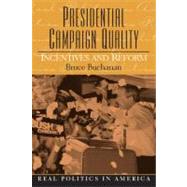
| The Problem: Democracy's Incentive System | |
| Quality from Crisis: The 1960 and 1992 Campaigns | |
| Status Quo Politics: The 1988 and 1996 Campaigns | |
| Why Quality Matters | |
| Beyond Mandates: The Policy Signal | |
| Voter Leverage: The Credible Threat | |
| Civic Duty: A Strategy for Change | |
| Table of Contents provided by Publisher. All Rights Reserved. |
The New copy of this book will include any supplemental materials advertised. Please check the title of the book to determine if it should include any access cards, study guides, lab manuals, CDs, etc.
The Used, Rental and eBook copies of this book are not guaranteed to include any supplemental materials. Typically, only the book itself is included. This is true even if the title states it includes any access cards, study guides, lab manuals, CDs, etc.